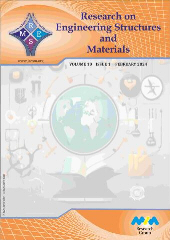Keywords
Abstract
HDPE 80;
Wear;
Taguchi method;
Optimization;
Aging
In this work, we studied the influence of accelerated aging in an aggressive environment of high-density polyethylene (HDPE 80) used for pipeline applications to distribute gas. Accelerated aging by ultraviolet irradiation of the wavelength lamps (λ = 365nm) for 240 hours at a temperature of 35°C exposed samples to solar radiation on the sand in southern Algeria for 12 months. The samples were subjected to weathering at -10 °C and 25°C for four different durations. To assess the weight loss capacity of semi-crystalline polymer behavior (HDPE 80) Under accelerated aging conditions, aging is carried out mainly according to three referenced methods: ISO 105 B02/B04, DIN 75202, and SAE J 1885. The Taguchi method and regression analysis were used. Several experiments were conducted on a vertical milling machine using a multi-factor L16 (4^1*2^3) orthogonal mixed matrix. An analysis of variance (ANOVA) was used to determine the effects of treatment: corrosion, weight loss, and loss of thickness. The parameters are influenced by the sandpaper's grain diameter, cutting speed, and compressive strength continuity over two hours, with each trial lasting 15 minutes. Using S/N ratios, optimal control factors were determined to minimize lost weight (P) and thickness loss (∆L) due to abrasion of HDPE polyethylene pipes 80. At A3, B2, C2, D2 (i.e. degradation mode = UV, rotation speed = 355 rpm, load = 9.3 N, abrasive paper = 10.3 degrees) and A3, B1, C2, D1 (i.e. degradation mode = UV, rotation speed = 180 rpm, load = 4.65 N, and abrasive paper = 18.3 degrees), ideal conditions for weight and thickness loss were observed.
© 2024 MIM Research Group. All rights reserved.

